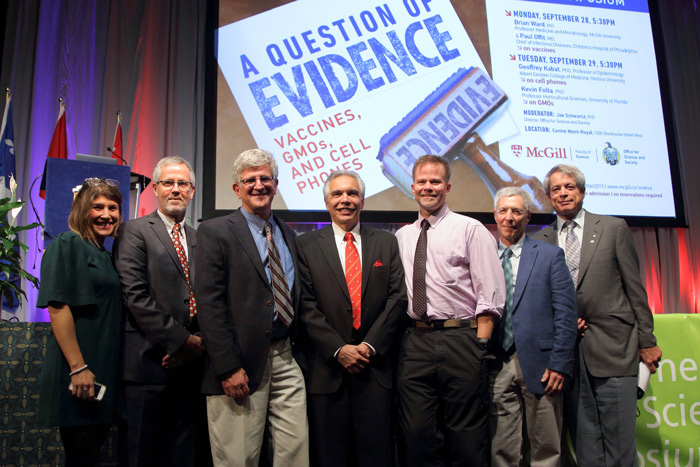Known for his ventures in communicating science to the general public, Director of the Office for Science and Society (OSS), Joe Schwarcz moderated the 10th annual Lorne Trottier Public Science Symposium this past Monday and Tuesday at Centre Mont Royal. Every year, the symposium brings together like-minded individuals to discuss a number of controversial topics. This year, speakers included Dr. Paul A. Offit, Dr. Geoffrey Kabat, and Dr. Kevin Folta, who tackled issues surrounding vaccines, genetically modified organisms (GMOs), and cell phones, respectively.
The first talk, presented by Offit, who is the director of the Vaccine Education Center at the Children’s Hospital of Philadelphia on Monday, focused on the fear of vaccinations. The rates of diseases such as measles or whooping cough have dramatically lowered, largely due to the use of vaccinations in the past.
“[Today’s] people grew up in a time when none of these diseases existed,” Offit said. “They have not been exposed, so they are not afraid.”
This lack of exposure means people aren’t afraid of the repercussions.
“Fear of vaccines stems from a lack of fear of the diseases,” explained Offit.
The second day of the symposium covered the issue of cell phone radiation. Kabat, an epidemiologist from the Albert Einstein College of Medicine in New York, spoke about cellphones and their possible relation to brain cancer, which first became an issue in 1993.
“A man whose wife had died of cancer at a young age went on a popular television program in the U.S. and claimed that her cancer was caused by her talking constantly on her cell phone,” said Kabat in an interview on Larry King Live. “If one looks at all of the evidence that we now have, there is no convincing signal that use of cell phones or exposure to these waves from WiFi is having any harmful effects on health.”
Kabat showcased a number of cell phone-use studies and highlighted that most studies, such as the Interphone study of 2010, showed no trend of increased cell phone use causing brain cancers.
“[Unfortunately,] it is just a fact that positive results—whether right or wrong—get much more attention than negative results,” said Kabat during his talk. “Cell phone activists latch onto positive results but ignore the totality of the evidence.”
A study conducted in 2011 by Lennart Hardell, oncologist and professor at Örebro University Hospital in Sweden, did uncover a correlation between increased cell phone use and the development of cancers. Nevertheless, Kabat explained that those results should be taken with a grain of salt because the cases examined were patients that had filled out reports about themselves, and were taken from hospitals or tumour registries. Consequently, the patients may have been looking for a correlation between cancer and cellphone radiation.
“[Data can be distorted when you ask] people to remember their use of cell phones going back decades,” said Kabat. “Cases [can report] different information due to recall bias”.
Folta, a professor of Horticultural Science at the University of Florida, then addressed the safety of using GMOs.
“Our food supply in the U.S.A. has never been more diverse, safe and plentiful,” Folta began. “In 18 years of use in plants, there has not been one case of illness or death related to these products.”
According to Folta, the fear of GMOs is a consequence of the popular belief that genetic engineering is harmful; however, Folta stressed genetic improvement has existed for decades.
“All existing crops and animals have [already] been radically reshaped by humans,” Folta said. “[Plants can be genetically modified to produce] more variety, a greater crop yield and have added virus resistance and insect resistance.”
These types of genetic modifications have helped reduce the need for pesticide use. Furthermore, they’ve helped prevent vitamin deficiencies because crops can be fortified to be more vitamin rich. For example, golden-rice—a genetically modified strain of rice rich in beta-carotene—is produced and consumed in developing countries, like the Philippines and Bangladesh.
“Whether you’re for or against GMO labelling, it’s a non-issue,” said Folta. “We can worry about luxuries like that once everybody’s fed.”
Both Kabat and Folta stated that they believe that increased scientific literacy is required within the general media, because more and more, media outlets will favour headlines that yield larger audiences, without considering the facts. Consequently, frustration has grown within the scientific community.
“There’s a strong feeling among scientists that we need to become the media,” said Folta.








